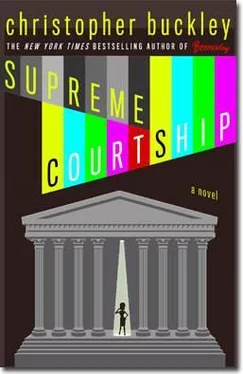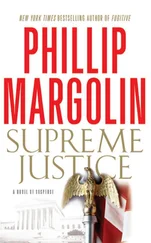“No, Justice Haro,” the lawyer said, delighted, “the firing pin was manufactured at the New Haven facility. By nonunion labor. You’ll recall, per Sikorski v. United Strutfitters Local 12, that Rimksi was in judicare.”
“Um,” said Justice Haro, as though he had been reminded of a fact translucently well known to himself. “So clearly there’s no in remoto aspect here?”
“None whatsoever,” the lawyer said triumphantly.
Chief Justice Hardwether leaned forward into his microphone and said softly, “You seemed to go out of your way not to adduce Persimmon v. Aberdeen Wheelchair.”
There was a slight but perceptible intake of air in the hall.
The lawyer smiled demurely. “I had a feeling you were going to bring that up, Mr. Chief Justice. I reread Persimmon. But try as I might, I could find no iteration of quem protesto.”
Hardwether curled the side of his mouth, not unpleasantly, in a sort of Oh-come-on-now-do-I-really-look-like-I-just-fell-off-the-turnip-truck? look. “Did you read as far as page 653 before declaring moral victory?”
The lawyer froze. “I… believe… yes…”
“Then you’re well aware that quo warranto has no provenance here, absent guided direction.”
A sound went through the court like a hundred snakes slithering across the marble floor. Hardwether had just scored a palpable hit! You could hear the muttering: Declan may be hitting the sauce, but he hasn’t lost his edge.
“You have me there, Mr. Chief Justice,” the lawyer conceded, his face reddening, “but might I tempt you with Ordpurvis v. Sioux Falls Hydro-Electric.”
By now Mo Gotbaum was on the third verse of “Born to Be Wild.” Herself, Pepper felt like the Norwegian painting of the guy silently screaming.
Chief Justice Hardwether continued, “You could try. But I would stipulate, if I were you, that the South Dakota Circuit Court went out of its way in Ordpurvis to point out that in its view it was a clear-cut case of interrebus quod aspecto and that it had absolutely zero bearing per res sciatica. Now,” he said, the picture of a reasonable man, “if you want to go that way, I’d say take a look at Shrump v. Hartsdale Motorworks-”
“Could I just say something here?” Pepper blurted.
Everything froze in the Great Hall of the United States Supreme Court. Time stopped. At which point Pepper, with dawning horror, realized that all eyes were on her.
Oh. My. God, she thought. First time out-first time out-and she had just interrupted a fellow justice. And not any justice. The Chief Justice. Way to go, girl. In the hierarchy of no-nos, that was right up there with vomiting on the Pope during High Mass at St. Peter’s. She wanted to shrink inside her robe like a turtle.
Justice Hardwether, somewhat taken aback, nodded faintly and said, “Yes, Justice Cartwright. Of course.”
Whereupon Pepper’s mind suddenly went as blank as a crashed computer screen. She pressed every button, but all she could see on the screen was a blinking icon that said, YOUR HARD DRIVE IS EMPTY.
“I…” she tried, “with respect to”-she couldn’t even remember what case they were discussing-“… there is… it seems to me to boil down to quem… I mean, quasi… modo…”
A deep and terrible silence came over the Great Hall during which the sound of subatomic particles coming together would have been louder than clashing cymbals.
Justice Santamaria leaned forward into his microphone and said to the lawyer, “It’s an interesting point and one, to be honest, I hadn’t considered. So, Counselor, do you think Quasimodo v. Notre Dame Bellringers Guild has application here?”
The Great Hall erupted with laughter. It filled the marmoreal space like helium. Never in the memory of the eldest present Court watcher had there been such a spontaneous explosion of levity. Justice Hardwether, struggling himself not to join in, finally tapped his gavel to restore decorum.
PAIGE PLYMPTON came to Pepper’s chambers, where the newest justice had been having a good sob.
“My first oral argument,” Paige said, “I became so befuddled that I kept referring to Gideon v. Wheelwright.”
Pepper dabbed at her eyes and stared blearily.
Paige added, “And of course it’s Gideon v. Wainwright. Well, my dear, let me tell you, ‘mortified’ is no mere expression.”
“Thanks, Paige,” Pepper said, honking into her tissue, “that makes me feel a whole lot better.”
The next day’s Washington Post brought a predictable harvest of shame: a story in the Style section about the TV Justice’s first day of oral argument. It was illustrated with a still photograph from the movie The Hunchback of Notre Dame, with Pepper’s face superimposed over Maureen O’Hara’s offering a sip of water to Quasimodo.
There was a second serving of crow, this one in the form of a headline:
DEXTER MITCHELL (FINALLY) BECOMES PRESIDENT CONNECTICUT SENATOR TO STAR IN NEW TV SERIES
Pepper’s eyed widened as she caught a familiar name in the second paragraph.
Buddy Bixby, producer of TV’s “Courtroom Six” and other reality shows, today confirmed that he has offered Senator Dexter Mitchell (D-Conn) the lead role in a projected prime-time dramatic series tentatively named “POTUS.” The term is the White House abbreviation for “President of the United States.”
Bixby said that he became interested in casting Senator Mitchell during the Pepper Cartwright hearings.
“I’ve been in this business long enough to know talent when I see it,” Bixby said in a telephone interview from his Manhattan office. “He’s got it-intelligence, looks, and credibility. He’s been there and done that. He’ll make a completely believable president. Who knows where it could lead,” the producer said with a laugh, “look what happened to the last person I discovered.”
His wife, Pepper Cartwright, was recently confirmed to the Supreme Court. The couple are reportedly divorcing. Bixby is also suing Justice Cartwright for breach of contract for leaving “Courtroom Six.”
Dexter was pleased by the turnout of reporters for his farewell press conference. Buddy had wanted him to hold it outdoors, on the West Front of the Capitol Building, where incoming U.S. presidents were now inaugurated. Dexter briefly mulled the notion before (wisely) vetoing it. He’d have his moment on the West Front someday. For now, the Strom Thurmond Memorial Room would do nicely enough. His press secretary made sure that the podium was within camera range of the bust of JFK, to remind the viewers subliminally of another New England senator who had gone on to bigger things.
“This is a bittersweet day for me,” Dexter began, casting his eyes downward while biting his lower lip, a gesture he had learned from a master politician. He gave Terry-“my life’s partner,” as he put it-a brave glance. Camera shutters clicked away like demonic crickets. Dexter’s face was momentarily bathed in so much flashlight that he feared he might never see again. Terry did her best to look wistful while inwardly doing cartwheels and jetés of unbridled joy. We’re in the mo-ney, we’re in the mo-ney! Dexter gave his life’s partner a little nod of encouragement as if to say, I know it’s hard, honey, but together, we’ll get through this. Terry looked back at him as if to say, Yes, dear, it is hard. It’s all I can do to keep from shouting “Free at last, free at last! Thank God Almighty, I’m free at last!” Terry tried not to think of the bigger house. Of the beach house. Of a house in the south of France. Of not having to spend another day on K Street wheedling railroad subsidies out of her husband’s colleagues.
She stirred from the delicious reverie and crashed back into reality and the sound of her husband’s voice. What was he talking about now? She heard the phrase “decades of public service.” Oh, no. God, no. Please, someone-interrupt him with a question or we’ll all be here until the polar ice caps melt.
Читать дальше











